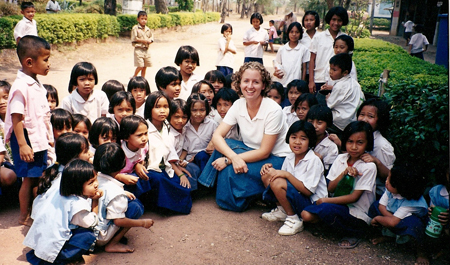Alumna is champion of childrens' rights
The rights of children worldwide stand to be vastly improved as a result of efforts by Sara Austin, alumna of our Master's in International Human Rights Law. Sara was instrumental in creating new United Nations legislation, ratified on 14 January 2014, which gives children the power to appeal directly to the United Nations when their rights are violated.

Sara developed the proposal for the legislation through writing her dissertation for the Master's programme.
'As a graduate student in international human rights law at Oxford I wanted to use my studies to make a tangible difference to the lives of children,' said Sara. 'The 1989 Convention on the Rights of the Child (CRC) was the only international human rights legislation without a mechanism to allow complaints, so children whose rights were violated had no way to actually hold governments accountable. This was unacceptable to me.'
The new legislation, called the 'Third Optional Protocol' provides for a communications procedure that allows children, groups of children or their representatives to submit a complaint about violations of their rights by their State to the UN Committee on the Rights of the Child.
'Children are the most vulnerable - and often the most exploited - citizens in many countries,' said Sara. 'The decision to build my dissertation around a proposal for the third Optional Protocol to the CRC was easy. I defended my dissertation in the spring of 2006; then the real work began,' said Sara. 'Over the next eight years I worked with a coalition of NGOs relentlessly pushing the UN to make this law a reality for the millions of girls and boys who grow up abused, ignored or neglected.'
For those countries which have ratified the Optional Protocol, children's complaints will be fielded by the UN Committee on the Rights of the Child. The country in question is then required to provide proof that the changes have been made.
Countries that have ratified the Optional Protocol so far include Albania, Bolivia, Gabon, Germany, Montenegro, Portugal, Spain, Thailand, Slovakia and Costa Rica.
 'The 14th of January 2014 was a watershed moment for these children when Costa Rica became the tenth country to ratify the protocol, putting it into force in the 10 ratifying nations,' said Sara.
'The 14th of January 2014 was a watershed moment for these children when Costa Rica became the tenth country to ratify the protocol, putting it into force in the 10 ratifying nations,' said Sara.
'This was a huge win, but the work is far from finished,' Sara said. 'The original 1989 Convention on the Rights of the Child is the most widely ratified convention in UN history, with only three countries choosing not to ratify. If we can get as many countries to ratify the third Optional Protocol, it will mean a drastically different future for children worldwide whose lives are marginalized every day.'
Dr Andrew Shacknove, Director of the Master's in International Human Rights Law, said: 'Sara has tenaciously advocated for the new Protocol since she invented the idea in her dissertation. Many of our students have proposed one or another new international instrument at the end of their dissertations. Sara is the first to make it happen.'
To learn more, please see the following news stories:
To learn more about the Master's in International Human Rights Law, please see:
Published 30 January 2014
